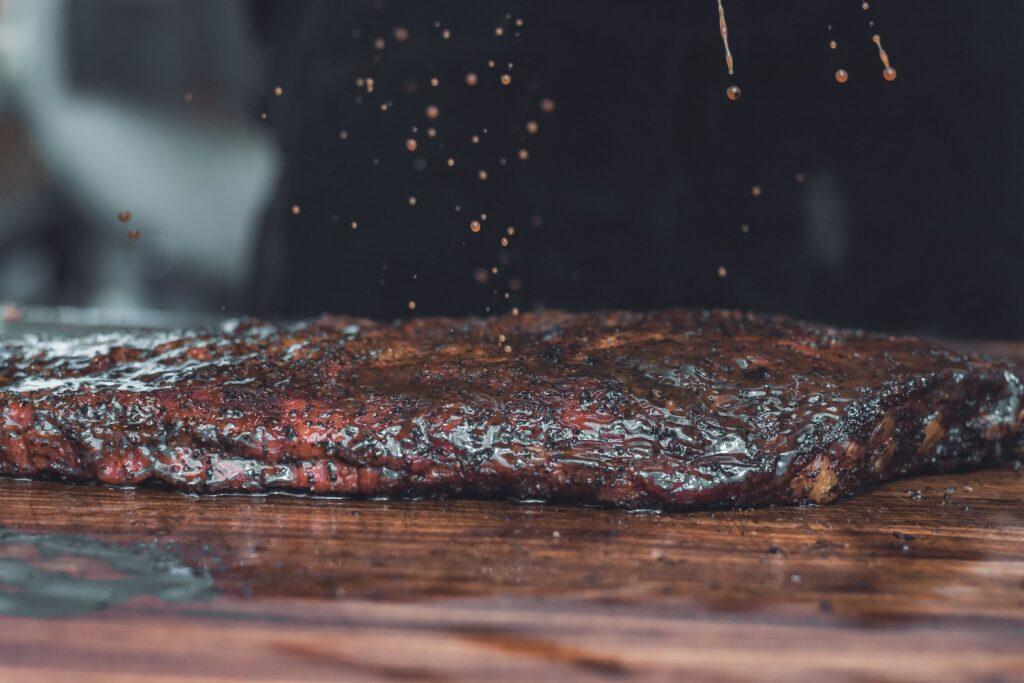We believe in celebrating the rich culinary tapestry that defines various cultures around the world. Today, we embark on a delectable journey to explore the enticing realm of Jewish barbecue. Despite its unconventional nature, Jewish-style barbecue has captivated the taste buds of many, bridging the gap between traditional Jewish flavors and beloved American barbecue classics. Join us as we delve into the nuances, history, and mouthwatering dishes that make Jewish barbecue a truly remarkable culinary phenomenon.
Embracing Jewish Barbecue: The Fusion of Cultures
Jewish barbecue might seem like a peculiar concept, considering that the quintessential American barbecue often revolves around pork, a meat that is far from kosher. However, the beauty of Jewish barbecue lies in its ability to harmoniously blend the culinary traditions of Jewish heritage with the smoky, finger-licking goodness of American barbecue. This union is brilliantly showcased at Pulkies, a captivating Jewish-style barbecue joint located in the heart of New York City’s Chelsea Market.
Led by the visionary Harris Mayer-Selinger, Pulkies weaves together the cultural threads of Jewish identity and American barbecue. Drawing inspiration from cherished family recipes, Mayer-Selinger infuses traditional Jewish flavors into his creations, resulting in tantalizing dishes like “brisket-y” carrots and onions, and noodle kugel mac and cheese. At Pulkies, you’ll discover a culinary symphony that speaks to Mayer-Selinger’s personal journey as a cook, an eater, an American, and a Jew.
The Intersection of Kosher and Jewish Barbecue
Although kosher barbecue may appear distinct from Jewish barbecue, the two share an inseparable bond. Pulkies, while not strictly kosher, embodies the essence of Jewish-style barbecue. It is important to acknowledge that kosher pitmasters have long been honing their own interpretations of Jewish barbecue. These talented individuals, like Rabbi Mendel Segal of Mendel’s Backyard BBQ & Brew in Miami, strive to create exceptional barbecue without compromising on taste or quality.
In the realm of kosher barbecue, there are common misconceptions that Rabbi Segal aims to dispel. Firstly, a kosher brisket should taste no different from its non-kosher counterpart. The key lies in the meticulous adherence to kosher laws during the animal slaughter and food preparation process, rather than any inherent flavor distinction. Additionally, kosher certification does not imply rabbinical blessings; rather, it ensures compliance with specific dietary laws.

A Flavorful Tapestry: Exploring Jewish Barbecue Traditions
Jewish barbecue, with its diverse interpretations and cultural nuances, embraces a spectrum of flavors and techniques. Ari White, the mastermind behind The Wandering Que, a kosher barbecue truck and pop-up in Hackensack, N.J., is devoted to making non-kosher delicacies accessible to the kosher world. His innovative approach showcases kosher versions of chitlins (made of chicken), bacon (made of lamb), and sausage (made of beef), pushing the boundaries of traditional kosher cuisine.
Another trailblazer, Dani Goldblatt, disrupts the kosher barbecue scene as a woman excelling in a predominantly male domain. As the owner of Holy Smokes Kosher BBQ in Los Angeles, Goldblatt’s dedication to her craft and orthodox Jewish heritage shines through her remarkable smoked brisket. Her passion for barbecue, combined with her expertise as a high school Jewish studies teacher, creates an extraordinary fusion of flavor and tradition.
The Brisket Saga: An Emblem of Jewish Barbecue
Jewish barbecue owes much of its character and charm to the beloved brisket. Historically, brisket held a place of significance within the Jewish culinary landscape due to its affordability. Jewish immigrants in 18th and 19th-century New York gravitated toward this cut of meat, transforming it into deli staples like corned beef and pastrami, now synonymous with Jewish cuisine.
While traditional Jewish-style brisket is typically braised, the brisket preparations at Jewish barbecue spots today are as diverse as the pitmasters behind them. At Pulkies, Mayer-Selinger confits the brisket in its own flavorful fat, creating a succulent and tender masterpiece. Meanwhile, at Shmorg in Los Angeles, Alexander Remer cures briskets overnight, infusing them with layers of rich flavor. And at Milt’s Barbecue for the Perplexed in Chicago, Bryan Gryka avoids mesquite, emphasizing his personal preference for other wood flavors.
Embracing the Spectrum of Jewish Barbecue
Just as the spectrum of Jewish observance varies, Jewish barbecue encompasses an array of interpretations and practices. From strictly adhering to kosher-certified establishments to more lenient approaches that accommodate individual preferences, Jewish barbecue caters to a diverse range of palates and observance levels.
It’s crucial to recognize that Jewish barbecue is more than a culinary art form; it embodies cultural heritage, religious identity, and a shared sense of community. Each interpretation adds another brushstroke to the vibrant canvas that is Jewish barbecue, elevating it beyond a simple genre of cuisine.
Conclusion
Jewish barbecue, with its bold fusion of traditional Jewish flavors and American barbecue classics, invites us to explore a realm of culinary delight. Pulkies, along with other Jewish-style and kosher barbecue establishments, serves as a testament to the creative vision and passion of talented pitmasters. By honoring Jewish heritage and embracing the flavors that Jews are familiar with, Jewish barbecue captivates the hearts and palates of those seeking unique and mouthwatering experiences.
As we conclude this captivating journey into the world of Jewish barbecue, we invite you to indulge in the vibrant tapestry of flavors, techniques, and cultural intersections that make Jewish barbecue an extraordinary culinary adventure. Whether you savor a succulent slice of smoked brisket or relish the unexpected twists on traditional dishes, Jewish barbecue promises to leave an indelible impression on your taste buds and evoke a deep appreciation for the blending of cultures in the realm of food.
FAQs
What is Jewish barbecue?
Jewish barbecue refers to the practice of grilling and smoking meats in accordance with kosher dietary laws. It involves using kosher ingredients and following specific preparation and cooking methods to ensure the food remains kosher.
Why is BBQ not kosher?
Traditional BBQ often involves using non-kosher ingredients such as pork or shellfish, which are not permitted in kosher dietary laws. Additionally, the cooking process may not adhere to kosher guidelines, such as the separation of meat and dairy products.
What do you serve at a kosher BBQ?
A kosher BBQ typically includes a variety of meat options such as beef, chicken, lamb, or turkey, as well as vegetarian or vegan options. Side dishes like grilled vegetables, salads, and kosher-certified condiments are also served.
Is Jewish brisket the same as BBQ brisket?
While both Jewish brisket and BBQ brisket involve cooking a beef brisket, they can have different flavors and cooking methods. Jewish brisket often includes slow cooking with savory seasonings and sauces, while BBQ brisket is typically smoked or grilled with a mix of spices and a barbecue sauce.
Why do Jews eat brisket?
Brisket has become a popular dish in Jewish cuisine, particularly during holidays and celebrations, because it is a relatively affordable cut of meat that can feed a large number of people. Its slow-cooked tenderness and rich flavors also make it a delicious choice for special occasions.
How do you make a kosher BBQ?
To make a kosher BBQ, it is important to use kosher ingredients and follow kosher dietary laws. This includes selecting meats with kosher certification, ensuring proper separation of meat and dairy products, and using kosher-certified utensils and equipment. It is also essential to have a designated grill for kosher cooking.
Can Jews eat pork?
No, pork is not considered kosher in Jewish dietary laws, and therefore, Jews do not eat pork.
Why is peacock not kosher?
Peacock is not considered kosher because it does not meet the specific criteria outlined in Jewish dietary laws. These laws dictate which animals are permissible for consumption, and peacock is not among them.
Why is bacon not kosher?
Bacon is not kosher because it is derived from pork, which is explicitly forbidden in Jewish dietary laws. Pork products, including bacon, are prohibited for consumption by those who observe kosher dietary restrictions.
Can fish meat be on the same grill kosher?
According to kosher dietary laws, fish and meat should not be cooked or consumed together. Therefore, if you want to maintain kosher standards, it is recommended to use separate grills or grill surfaces for fish and meat.
Is kosher the same as no pork?
While kosher dietary laws do prohibit the consumption of pork, being kosher involves much more than just abstaining from pork. Kosher guidelines encompass the entire process of food preparation, including the selection of ingredients, cooking methods, and the separation of meat and dairy products.
Can you kosher your own meat?
It is possible to kosher meat at home, but the process can be complex and requires specific knowledge and adherence to kosher guidelines. It is often recommended to seek guidance from a knowledgeable authority or a certified kosher butcher when koshering meat at home to ensure it is done correctly.
Last updated: October 23, 2023

